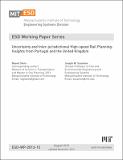Uncertainty and Inter-jurisdictional High-speed Rail Planning: Insights from Portugal and the United Kingdom
Author(s)
Stein, Naomi; Sussman, Joseph M.
Downloadesd-wp-2013-15.pdf (2.493Mb)
Metadata
Show full item recordAbstract
Within public policy and academic discourses, high-speed rail (HSR) is presented as a way of achieving “smarter” or more sustainable forms of growth. Realizing this promise requires coordinated policy efforts across levels of government and at different moments along a project’s timeline. The research presented here makes use of a systems perspective to study the barriers to- and opportunities of inter-jurisdictional HSR planning. The paper draws on interview material with officials involved in the Portuguese and United Kingdom HSR planning processes.
Uncertainty is found to be of significant relevance to the manner in which national and local or regional governments interact. Those interactions in turn affect the realized physical reality of the HSR network and its integration into existing land use and transport systems. The paper examines two sources of uncertainty—uncertainty of outcomes and the uncertainty of a multi-actor inter-jurisdictional system of control.
Case studies are used to explore how existing processes and evaluations mechanisms affect the level to which local knowledge and initiatives are incorporated into iterative HSR system design. The research additionally reveals how initial conditions can be important determinants of HSR success by shaping a system’s ability to adapt to realizations of currently uncertain futures.
The paper concludes by offering two approaches to building a HSR implementation process that successfully incorporates HSR-supportive local and regional policies. The approaches combine formal inter-jurisdictional planning commitments with informal coalition building, to together enhance HSR’s ability to achieve its full potential.
Date issued
2013-11Publisher
Massachusetts Institute of Technology. Engineering Systems Division
Series/Report no.
ESD Working Papers;ESD-WP-2013-15